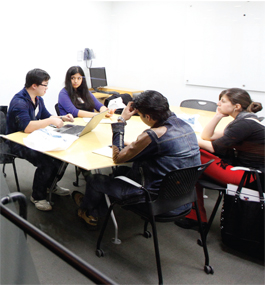How to Succeed in Business (in a Weekend)

Mike Lovett
A 3DS team convenes for a quick strategy session.
by David Levin
On a Saturday afternoon in April, students are drifting lazily across the Brandeis campus. Some are searching for a late lunch; others are buried in books, clutching a cup of coffee.
But for a small team of young entrepreneurs, the day is much less relaxed. Six graduate and undergraduate students are frantically researching a new business idea: a smartphone app called BarTinder, which helps users find nearby pubs. Tucked away in an unused classroom, they’re bent over laptops, working out potential revenues, polling friends and combing the Web for similar services to gauge their effectiveness.
Less than 24 hours ago, they were all total strangers.
Team BarTinder was one of four groups of entrepreneurs participating in Three-Day Startup (3DS), a program organized each spring by the Brandeis International Business School (IBS). The event spans a single 55-hour weekend, during which students from across campus work in teams to develop new businesses. It’s an exercise in what Brandeis IBS professor Ben Gomes-Casseres ’76, P’15, calls “agile entrepreneurship” — taking the seed of an idea and growing it into a realistic plan, overnight.
“The point of 3DS is to train students’ entrepreneurial muscles,” says Gomes-Casseres. “It lets them experience what it takes to focus on an idea, work in a team to tease out the key parts, and then pitch it to potential funders. That’s not something they can learn from lectures — they need to get their hands dirty.”
In addition to BarTinder, this year’s business ideas included PoliticalPulse, a website for user-generated political commentary; VapeRater, an online store and information center for e-cigarettes; and FriendDeed, a social-media site that connects users who want to volunteer time and expertise to help others.
“The students always come up with big ideas; the challenge they face is shaping them into a real business plan,” Gomes-Casseres notes. “It’s a fascinating process to watch all this take place in fast-forward speed over the 3DS weekend.”
On Sunday night, the teams present their business plans to a panel of judges from the Boston business and venture community. If one of these plans seems viable, it could earn a spot at MassChallenge — one of the world’s largest startup accelerators, backing dozens of new businesses each year.
As the teams rush to finalize their presentations, shouts ring out from classrooms. Students debate last-minute details of what their website might look like. Others come back with early market feedback from online polling they conducted. Some argue the finer points of revenue. Most look exhausted — they’ve been at this for two days straight and haven’t slept more than a handful of hours.
In an auditorium packed with students, faculty and friends, team VapeRater walks to the front of the room. Although their presentation is polished, the students face a tough crowd — the panel of judges seems skeptical, even slightly repulsed by the idea of e-cigarettes. Some judges, like Martin Sinozich, a real estate developer and investor at North Carolina-based Venn Capital, find the team’s financial projections — a 46 percent profit margin within five years — to be overly optimistic.
“Can you name three other distributors who have 46 percent net margins?” Sinozich asks with raised eyebrows. “I would look harder at your numbers.”
Later, Alex Wilson ’15 and his team present their plan for PoliticalPulse, which he describes as a way “to mix social media and news, and create a place where political discussion can be led by citizens, instead of pundits.”
“What if I told you that we could create a major disruption to the mainstream news industry?” Wilson asks the panel with a smile. “Would that be something that would interest people?”
The judges, including Kyle Alspach, a technology reporter for BetaBoston.com, stir slightly in their seats.
“Political bias would absolutely be part of this,” Wilson adds. “It’d be conservatives saying what they have to say, or liberals saying what they have to say. Having those opposing ideas would make PoliticalPulse a comprehensive site.”
The concept, he notes, already has a model in the Bleacher Report, a user-generated sports commentary site bought by Turner Broadcasting in 2012 for nearly $200 million. Wilson thinks PoliticalPulse might be a source of valuable market information for political groups like the Democratic and Republican National Committees, giving it a unique source of income.
Ultimately, the panel of judges seems impressed by the idea, and by the end of the night they decide to award Wilson a coveted entrant spot at MassChallenge, where he’ll have the opportunity to grow his idea in the real world.
Those who don’t get the MassChallenge nod , however, don’t seem disappointed. On the contrary — Ken Harsch, MA’14, a graduate computer science student who led Team VapeRater, notes that 3DS gave him a valuable takeaway.
“We learned that everybody’s got ideas,” he says. “But an idea alone isn’t worth much. Execution is what makes a business happen.”
